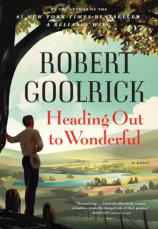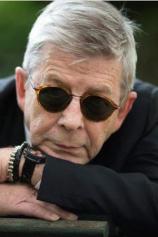Reading Group Guide
Discussion Questions
Heading Out to Wonderful

1. The novel begins with a first-person narrator who is not immediately identified but is revealed at the end of the story. What effect does his point of view have on the way the story is told? Did you find him to be a reliable narrator? How different do you think the story would have been if it were told from the point of view of a third-person omniscient narrator?
2. The book’s opening line is, “The thing is, all memory is fiction.” What do you think the author means by that? Do the novel’s characters and plot bear out this assertion? Can you remember times in your own life when something that you remembered as true turned out to be false, or when something you remembered as happening one way was later shown to have happened another way entirely?
3. The novel seems to make a distinction between sin and crime, neither of which, from outward appearances anyway, would seem to have established a presence in Brownsburg before Charlie met Sylvan. What do you think is the distinction between the two? What do you think is Charlie’s greatest sin, and what is his most heinous crime? Who else in the town do you think is guilty of sin, and what were those sins?
4. In the novel, the town of Brownsburg, circa 1948, is depicted as a nearly idyllic place, “where most people lived a simple life without yearning for things they couldn’t have” (page 5). Do you think this kind of depiction is an example of the fiction created by memory, or is this ideal something that American towns once had but have now lost? If you believe the latter, what do you think were the corrupting factors? What has been your own experience in this regard?
5. Early in the story, Will tells Charlie, “When you’re young, and you head out to wonderful, everything is fresh and bright as a brand-new penny, but before you get to wonderful you’re going to have to pass through all right. And when you get to all right, stop and take a good, long look, because that may be as far as you’re ever going to go” (page 16). Does this quote foreshadows the events to come in Charlie’s life, or is it merely a caution, a warning, from a wiser, older man? Had Charlie been able to settle for “all right,” at what point would he have realized that he had arrived at his destination? How would Charlie’s life have been different if he had settled for “all right”?
6. The novel is set just after World War II, in an era and a place where race relations were hardly simple or sanguine, and in the story, the racial divide is an almost constant element, even if it is not a central theme. What does Charlie’s willingness to befriend
the town’s black citizens—as witnessed in his desire to attend their church—tell you about him as a man, and what does it suggest about his past life?
7. Claudie, the black seamstress, was once given a chance to leave Brownsburg to try to find a life outside that town, yet she decided not to leave. Why do you think she made the decision to stay? What do you think would have happened if she had made that leap
and left Brownsburg?
8. How does the novel’s postwar setting inform the story’s mood, plot, and character development? How do you think the story would have played out had Charlie arrived in Brownsburg in the mid-1970s?
9. When Charlie Beale arrives in Brownsburg, he is back in the United States after serving in the Army overseas, and he carries with him two suitcases, one of which is made of tin and has a lock, “because it was filled with money. A lot of money” (page 10). Where and how do you think Charlie got all this money? If you were to create a backstory about what Charlie’s life had been like between leaving the service and arriving in Brownsburg, what would that story be?
10. Charlie feels most at home outdoors. What does this connection to nature and to the earth reveal about him? Do you think he yearns to be outdoors out of love or out of fear?
11. When Charlie sees Sylvan, he feels an immediate attraction. Other than her beauty, what do you think attracts Charlie to Sylvan? What attracts Sylvan to Charlie? What do they each seek in the other? Can you imagine a scenario in which their relationship could have a happy ending?
12. The novel seems to suggest that Sylvan’s yearning for Hollywood beauty, glamour, and fame is part of a larger American refusal to settle for reality. Do you think this longing was, in fact, a part of the national psyche in the late 1940s, or is it simply the
yearning of a girl who grew up without love or even hope? Do you think there is a tendency of lonely people to long for fame today? If so, how is it manifested?
13. “She wasn’t a bad girl,” the novel contends repeatedly about Sylvan (pages 53, 230, and 256). What do you think? How do Sylvan’s courtroom allegations about Charlie color the reader’s perception of her? It is clear in the novel that Charlie has fallen completely in love with Sylvan, but do you think she was ever really in love with him? Is it possible that she was—in keeping with her Hollywood fantasies—in love with the idea of being in love?
Heading Out to Wonderful
- Publication Date: June 12, 2012
- Genres: Fiction
- Hardcover: 304 pages
- Publisher: Algonquin Books
- ISBN-10: 1565129237
- ISBN-13: 9781565129238








